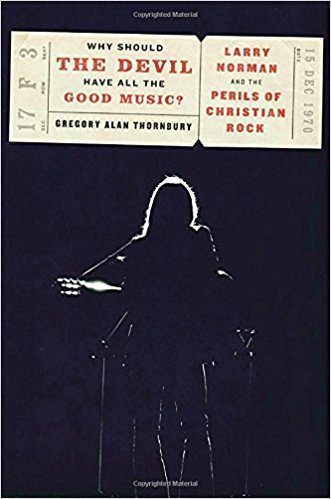 Chancellor Greg Thornbury at The King’s College (NYC) has written a biography of the Jesus movement musician Larry Norman Why Should the Devil Have all the Good Music.
Chancellor Greg Thornbury at The King’s College (NYC) has written a biography of the Jesus movement musician Larry Norman Why Should the Devil Have all the Good Music.
Let’s be plain: buy the book, now for the reasons.
Thornbury presents an alternative possibility: a white Evangelical movement that did not develop a corrupt, racist, anti-intellectual sub-culture. I know he is right, because I am just enough older than Thornbury to always have been bewildered at what happened to the movement.
Larry Norman represented the church of my childhood: helping the poor, against drugs and illicit sex, counter-culture. Jesus Freaks? I grew up with them. We were not locked into one party: we were for King Jesus. My Dad ran a ministry called The Cave which dealt with anyone, helped more than a few, and where Larry Norman would have fit right in. Like Larry Norman, Dad never changed, but the Christian world around both men did.
Thornbury writes bluntly and devastatingly about the growth of beta-Christian media and “thinkers:” second-rate culturally, beta-religiously.
This is not the church of the Jesus people.
Growing up, we did not like the bad sides of Hollywood, but someone created a bland version in Christian music, publishing, and education that betrayed everything we believed. We got ghost writers for celebrities that did not write their books. White Evangelicals stopped looking for racial justice . . . A topic that was always mentioned when I was a kid.
What if like Mom and Dad (fighting the good fight still!), we had stayed true? What if we had refused to retreat into convention?
This vision is not dead. We do not need the Christian media sub-culture. We can jettison it, because it exploits us. We are marks for the grifters who are fake.
Second, Norman demonstrates that all of us are deeply flawed. Thornbury is dealing with a man who lived long enough to leave an e-mail and paper trail that is both enviable and prevents fakery. Larry Norman was a sinner, but a sinner that kept trying to do right. He should have been stoned as a false prophet, confusing his own voice for God’s, but severe mercy made him a real prophet through failure and pain.
This is a work of massive scholarship, extensive notes, and a fan’s tribute without being for even a single paragraph a fanboy paean. Thornbury follows the argument where it leads and it leads to the this fact: Larry Norman gave us a road not taken. The Jesus Movement was overtaken by the grifters, the charismatics tamed by worried Evangelicals, and the Evangelicals corrupted.
Yet.
This is not a sad or bitter book, but a deeply hopeful one, because Larry Norman is dead, not God. As an educator, Thornbury dares to educate us on Larry Norman as Greg Thornbury, academic and Christian. This book is a Larry Norman like work of scholarship: genuine excellence in his field done by a Christian with all his beliefs in play.
To answer the title question: the devil has never had all the good music. A review of the stars of Norman’s time in the book reveals how few have endured. These were popular musicians who are no longer popular. Was their music good as music? Certainly some of the instrumentalists were groundbreaking and a few were stylistically innovative, but most good secular pop music has not endured the grinding judgment of time.
That’s not surprising, since most of what any of us do isn’t Bach or Louis Armstrong. The tragedy of Christian pop is that Christian musicians were not even doing their best and so most of what they did is even worse and less enduring. A pale image of passé is hard to see as having any value whatsoever. Norman refused narrowness and mere imitation. This was hopeful. The tragedy of his right choice is how few people followed him.
When he made bad personal choices, there was too small a community he could respect to help him stay sane. As he saw with prophetic vision, both Hollywood and Nashville betrayed the artist. There was less excuse for the Christian tolerance of grift and graft, since Christians knew it was wrong.
Still, beauty endured and in secular and Christian systems, the Holy Spirit kept calling. Thornbury taps that muse while writing carefully and arguing brilliantly. This is a very hard thing to do.
What Norman reveals is that any great music, really inspired, or just our best at our most shining moment, has some God in it. This is artistic diversity without relativism. Truth endures. Beauty is real. Goodness goes on being good. None of us fully capture the truth, beauty, or goodness. Instead, anytime anyone writes a good, true, or beautiful thing, she does so with the common grace of God bringing life to the image of God.
There is no “unChristian” beauty. Norman grasped this and for all his sorrowful problems, refused narrowness, in part because as a child of God beauty drove him. He knew, his own life showed him, that one could not cut oneself off from the world and become anything but more warped.
Larry Norman’s sins are obvious: no excuses. The grace he gave and received are also obvious and that is the way forward. The perils of Christian rock was not the rock, but the Christians. We still have time to change our minds and became worthy of revelation.
I hope we are ready.











